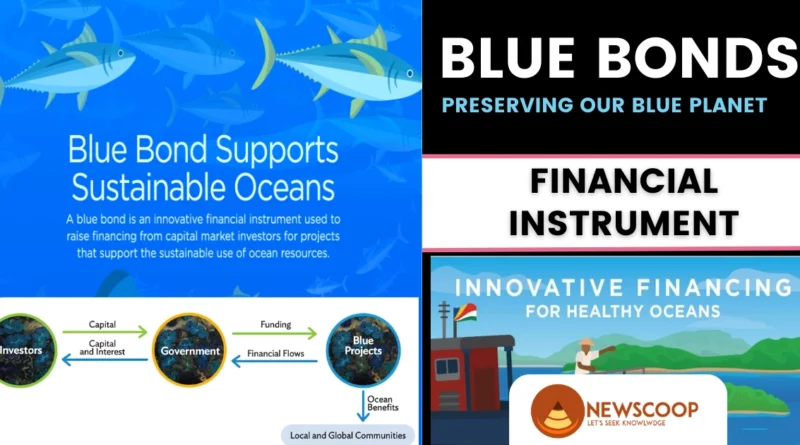Blue Bonds: Investing in Ocean Health | UPSC
India, a country blessed with a vast coastline and a rich marine ecosystem, recognizes the urgent need to preserve its oceans for future generations. To tackle the environmental challenges faced by its coastal regions, India has embraced the concept of Blue Bonds—a financial instrument designed to finance marine conservation efforts.
In this article, we delve into India’s adoption of Blue Bonds and how they offer a pathway to sustainable ocean conservation.
What is Blue Bond?
Blue Bond is a financial instrument specifically designed to raise funds for marine conservation and sustainable ocean-related projects. Inspired by the concept of Green Bonds, which focuses on financing environmentally friendly initiatives, Blue Bonds are aimed at channeling capital toward the preservation and restoration of marine ecosystems.
Objectives of Blue Bond
The objectives of Blue Bonds can be summarized in the following points:
- Financing: Blue Bonds aim to raise funds specifically for marine conservation and sustainable ocean-related projects.
- Marine Conservation: The primary objective is to protect and preserve marine ecosystems and biodiversity.
- Sustainable Fisheries: Blue Bonds seek to promote sustainable fisheries management and responsible fishing practices.
- Marine Protected Areas: The establishment and management of marine protected areas are supported to safeguard critical habitats and marine species.
- Coastal Resilience: Bonds aim to enhance the resilience of coastal areas against climate change impacts and coastal erosion.
- Marine Pollution Reduction: The objective is to reduce marine pollution and mitigate its detrimental effects on marine ecosystems.
- Research and Innovation: Bonds support scientific research, technological innovation, and the development of sustainable blue economy solutions.
- Sustainable Tourism: These Bonds promote sustainable tourism practices in coastal regions, minimizing environmental impacts and supporting local communities.
- Collaboration and Stakeholder Engagement: Blue Bonds encourage collaboration between governments, financial institutions, NGOs, and local communities to foster collective action towards marine conservation.
- Long-term Planning: Blue Bonds aim to encourage long-term planning and investment in the conservation and sustainable management of marine resources.
By addressing these objectives, Blue Bonds aim to mobilize financial resources, incentivize sustainable practices, and contribute to the preservation and restoration of our oceans for future generations.
How Blue Bonds Work?
Blue Bonds function similarly to traditional bonds, but with a specific focus on ocean-related projects. Governments, international organizations, or financial institutions issue these bonds, and investors purchase them.
The funds raised from the bond issuance are then allocated to initiatives such as marine protected areas, sustainable fisheries management, coastal restoration, research and development of innovative marine technologies, and the reduction of marine pollution. In return, investors receive periodic interest payments and the principal amount upon maturity.
Need of Blue Bond
The health of the world’s oceans is at a critical juncture. Overfishing has led to declining fish stocks, endangering the livelihoods of millions who depend on fishing for their sustenance.
Pollution, including plastic waste and chemical runoff, has wreaked havoc on marine life and ecosystems. Climate change has intensified ocean acidification and coral bleaching events, threatening the delicate balance of marine biodiversity. Blue Bonds offer a compelling solution by unlocking financial resources to combat these pressing issues.

Successful Examples of Blue Bonds
Several countries have embraced Blue Bonds as a means to fund marine conservation initiatives:
- Seychelles: In 2018, Seychelles became the first nation to issue a Blue Bond, raising $15 million. The funds were utilized to establish marine protected areas, enhance sustainable fishing practices, and develop the blue economy.
- Fiji: In 2019, Fiji issued a $50 million Blue Bond to support sustainable fisheries management and protect coral reefs, which are vital for tourism and coastal protection.
- Chile: Chile is exploring the possibility of issuing Blue Bonds to finance the protection and restoration of its marine ecosystems, including the endangered Patagonian Sea.
Blue Bonds: Transforming India’s Blue Economy
| Benefits of Blue Bonds in the Indian Context | Description |
|---|---|
| Strengthening, restoring, and protecting India’s water resources and ecosystem, including projects like the National Mission for Clean Ganga and Mission SAGARMALA. | Blue Bonds provide financing to support initiatives aimed at rejuvenating and preserving water resources, such as river rejuvenation and port infrastructure enhancement. |
| Increasing productivity in fisheries and agriculture sectors. | Blue Bonds supports projects that empower coastal communities, offering alternative income opportunities and sustainable livelihoods tied to marine ecosystem conservation. |
| Fulfilling global Sustainable Development Goals (SDGs) defined by the United Nations. | Blue Bonds align with SDGs, addressing environmental challenges and promoting sustainable practices to achieve specific SDG targets. |
| Empowering communities dependent on marine ecosystems. | Blue Bonds support projects that empower coastal communities, offering alternative income opportunities and sustainable livelihoods tied to marine ecosystem conservation. |
| Modernizing port infrastructure, wastewater, and solid waste management in an ocean-friendly manner to avoid pollutant dumping along the coastline. | Blue Bonds enable investment in modernizing port infrastructure and implementing sustainable waste management systems, reducing pollution and protecting marine ecosystems. |
Conclusion
India’s adoption of Blue Bonds reflects its commitment to preserving its coastal and marine ecosystems for future generations. By leveraging financial mechanisms to finance marine conservation initiatives, India is paving the way for sustainable fisheries management, conservation of coastal habitats, and the promotion of responsible tourism practices.
Through community engagement, research, and innovation, Blue Bonds empower India to chart a course toward a prosperous future where oceans thrive and support the well-being of its people.
Thank You!

